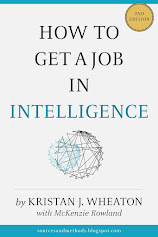Part 1 -- Introduction
Part 2 -- The Intelligence Job Market From 20,000 Feet
Part 3 -- The Good News!
Part 4 -- Even Better News!
Part 5 -- Beyond The Big Three
Part 6 -- Beyond Borders
Part 7 -- Beyond Borders: India, Europe And South Africa
Part 8 -- Going It On Your Own
Part 9 -- The 5 Things You Must Have
Part 10 -- Advice From The Trenches
Just when I was about to wrap this series up, all of a sudden a new report comes out that contains a number of juicy details about where jobs will be in the Federal Government over the next three years -- including amazingly, specifically, jobs in intel analysis!
The site with all the cool info is called Where The Jobs Are, 2009 and many thanks to my colleague Prof. Dave Grabelski for pointing it out to me. The specific section of interest to intelligence professionals is the Security and Protection section.
The Partnership For Public Service, a well-funded and well-connected non-profit with the stated mission to "revitalize our federal government by inspiring a new generation to serve" put the report together based on information provided by the 35 government agencies that participated.
The level of participation by the intel agencies is unclear. The CIA, for example, did not participate. The Department of Defense (DOD) and all of the services did participate, however, and this is important because nearly all (80% or more) of the intel budget falls under DOD.
Maddeningly, it is unclear what the numbers provided by the services actually represent. For example, I am pretty sure that the numbers on the site are for DOD civilian jobs and do not include military positions but I am not positive. Likewise, I am pretty sure that the DOD numbers include subordinate agencies like DIA and NSA but I cannot be sure since the CIA clearly opted out and these other agencies may have done the same.
Beyond the services, I have other questions about what the numbers actually mean. For example, the line item in the report labels the "Professional Field" as Intelligence Analysis. Does this include anyone associated with the intelligence analysis function? Or just analysts?
One article from the Washington Post does shed some additional light on the hiring picture, however. In its article announcing the publication of this report, the Post states:
- "Intelligence agencies expect to hire 5,500 people in the next year and "in the same order of magnitude" over the following two years, according to Ronald P. Sanders, chief human capital officer for the Office of the Director of National Intelligence. Such agencies include the Central Intelligence Agency and the National Security Agency. "It's a combination of how much turnover we expect and how much growth we expect in our budget," Sanders said."
- Any way you add up the numbers you get a reasonably consistent answer to the question of how many intel analysts the federal government needs each year:
- If you add up the numbers for the agencies listed needing professionals in the Intelligence Analysis field in this new report, you get 3676 over the next three years (or about 1200 a year).
- Previous info suggested that about 17% of the intel workforce are analysts. Using Sanders' 5500 total number, this translates to 935 new-hire analysts (17% of 5500) across the entire national security IC each year for the next three years.
- Both these numbers triangulate pretty well with my own, earlier, estimate of about 1000 total (as the median. The range was between 400-2000).
- The Department of Justice (DOJ) is undeniably the place to look for jobs as an analyst. More than a third of the total 3676 projected hires in intel analysis over the next three years are coming from DOJ according to the report.
- The factors mentioned by Sanders in the Post article were turnover and budget. Intel budgets are likely to remain flat so my guess is that this is mainly due to turnover and that much of this is driven by retirement. There is some support for this in the new report (see the Turnover Tab on the Security And Protection page).
- The factor not mentioned was a shift away from contract hires in intel (i.e. closing down contracts and making those workers move to the government side). Contractors currently add another 30+% to the total intel workforce. It is hard to imagine much widespread growth in the contract sector but there is no recent evidence to suggest that there will be a decline next year either (For more info on estimates with regard to contract hires see this post).
- Previous info suggests the US national security intelligence community has about 100,000 government employees. 5500 new employees each year based mostly on voluntary turnover translates to roughly a 5.5% turnover rate. If accurate, this places the US national security intelligence community in the same general category as other low turnover rate industries such as biotechnology and other high-tech industries.




